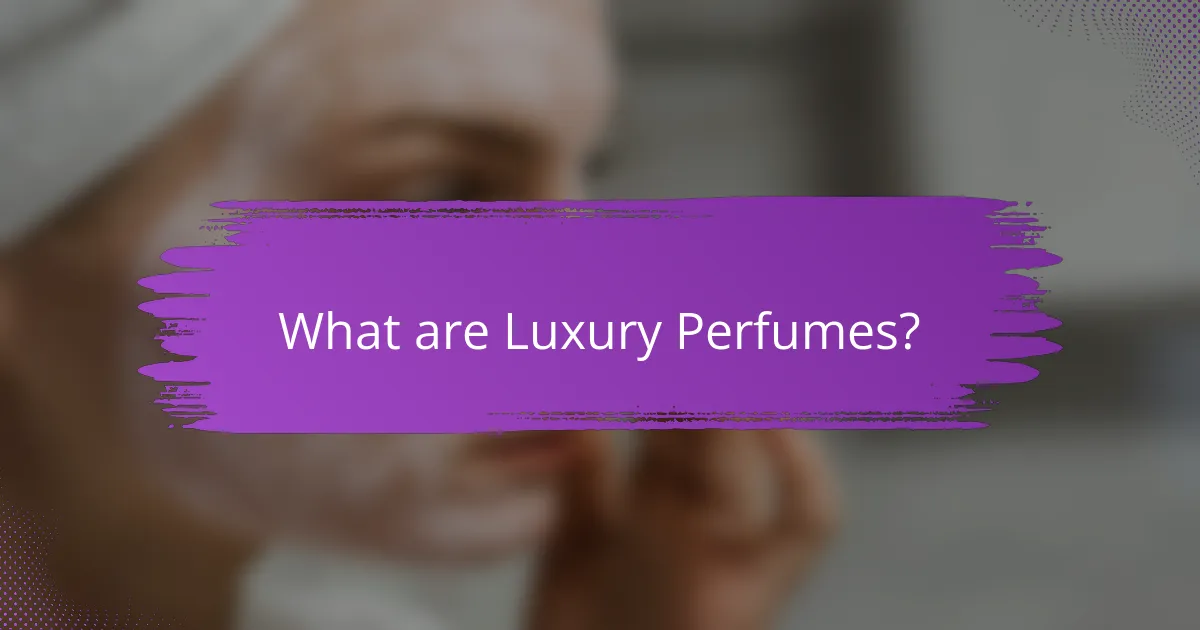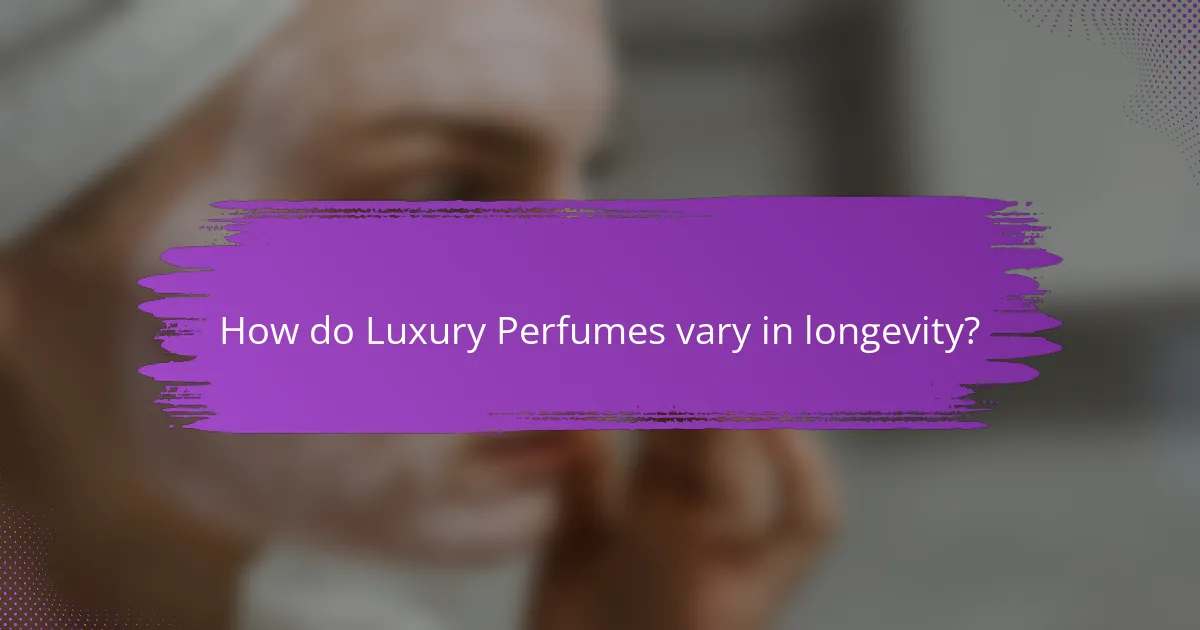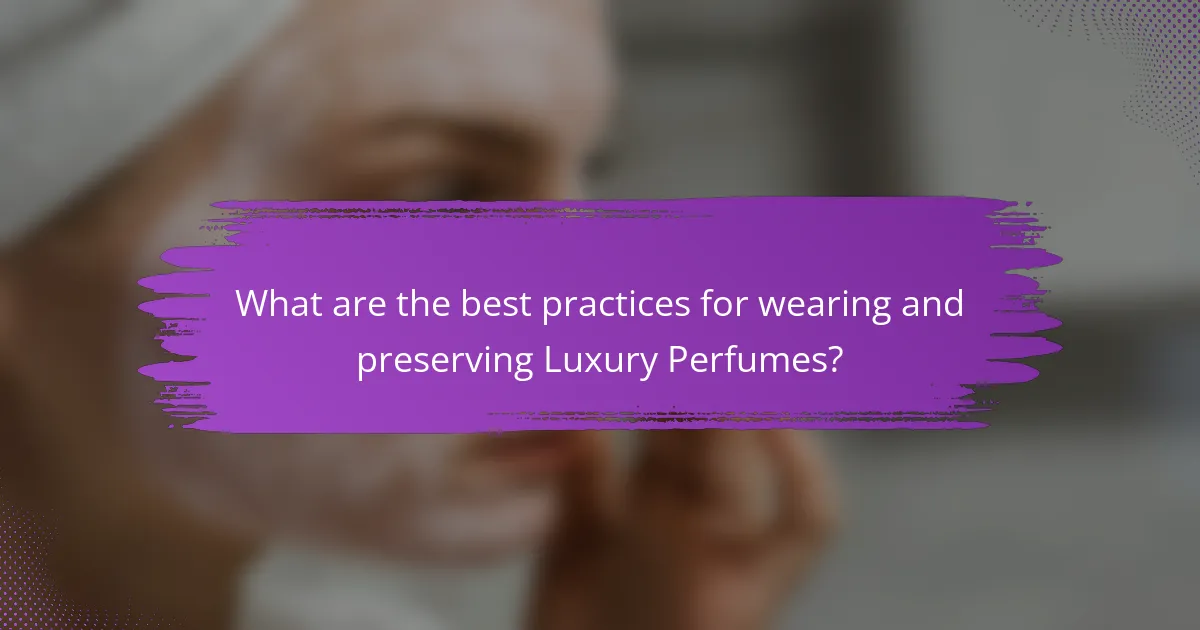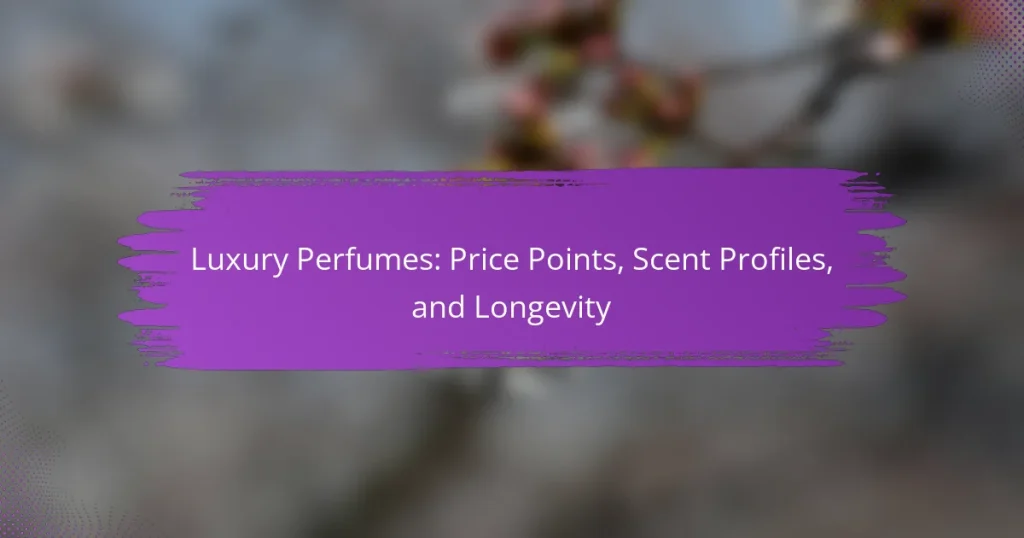Luxury perfumes are high-end fragrances characterized by superior quality, craftsmanship, and the use of rare ingredients. These exclusive products are produced in limited quantities and often come in elegant packaging, appealing to consumers who value sophistication and prestige. The article examines the price points, scent profiles, and longevity of luxury perfumes, highlighting how factors such as fragrance oil concentration and application methods influence their lasting power. It also provides guidance on proper storage and usage to maintain the integrity and freshness of these fragrances over time.

What are Luxury Perfumes?
Luxury perfumes are high-end fragrances that offer superior quality and craftsmanship. They often contain rare and expensive ingredients. These perfumes are typically produced in limited quantities. They are marketed towards consumers seeking exclusivity and sophistication. Luxury perfumes usually come in elegant packaging. The price points for these fragrances can be significantly higher than mass-market options. Many luxury brands have a rich heritage and history in fragrance creation. This combination of quality, rarity, and brand prestige defines luxury perfumes.
How are Luxury Perfumes defined in the fragrance industry?
Luxury perfumes are defined in the fragrance industry as high-end fragrances that emphasize quality, exclusivity, and craftsmanship. These perfumes typically use premium ingredients sourced from around the world. They often feature complex scent profiles that evolve over time, offering a unique olfactory experience. Luxury perfumes are usually packaged in aesthetically pleasing bottles, reflecting their brand’s identity. The price points for these perfumes are significantly higher than mass-market options, often ranging from several hundred to thousands of dollars. This pricing reflects not only the quality of the ingredients but also the brand’s heritage and marketing. Additionally, luxury perfumes are often produced in limited quantities, enhancing their exclusivity. This exclusivity contributes to their desirability among consumers seeking unique and sophisticated scents.
What distinguishes Luxury Perfumes from other types of fragrances?
Luxury perfumes are distinguished by their high-quality ingredients and craftsmanship. They often contain a higher concentration of fragrance oils, typically ranging from 20% to 40%. This results in richer, more complex scent profiles that evolve over time. Additionally, luxury perfumes are often crafted using rare and natural materials, enhancing their uniqueness. The production process is meticulous, often involving artisanal techniques. Luxury brands also invest in exquisite packaging, which adds to the overall experience. Furthermore, luxury perfumes tend to have greater longevity, lasting longer on the skin compared to mass-market fragrances. This combination of quality, complexity, and longevity sets luxury perfumes apart from other types of fragrances.
What are the common characteristics of Luxury Perfumes?
Luxury perfumes are characterized by high-quality ingredients and complex scent compositions. These fragrances often feature rare and natural materials, leading to unique olfactory profiles. The craftsmanship behind luxury perfumes typically involves meticulous blending techniques. Many luxury perfumes have a longer-lasting scent due to higher concentrations of fragrance oils. They often come in elegantly designed bottles that reflect the brand’s identity. Luxury perfumes are frequently associated with exclusivity and prestige, appealing to discerning consumers. Additionally, they may offer a signature scent that distinguishes them from mass-market options. The price points for luxury perfumes are generally higher, reflecting the quality and artistry involved in their creation.
What factors influence the pricing of Luxury Perfumes?
The pricing of luxury perfumes is influenced by several key factors. These factors include the quality of ingredients used, which often are rare and expensive. The brand reputation also plays a significant role in determining price. Luxury brands invest in marketing and packaging, contributing to higher costs. Additionally, the fragrance’s complexity and the skill of the perfumer can elevate pricing. Limited edition releases often command higher prices due to exclusivity. Finally, production costs, including labor and manufacturing processes, impact the final retail price.
How do ingredient quality and sourcing affect price points?
Ingredient quality and sourcing significantly influence price points in luxury perfumes. High-quality ingredients often require more rigorous sourcing processes. This includes sustainable harvesting and ethical practices, which can increase costs. For example, rare floral extracts can be more expensive due to limited availability. Additionally, sourcing from specific regions known for premium ingredients can also elevate prices. The use of natural versus synthetic components further impacts cost. Natural ingredients typically command higher prices due to their complex extraction methods. Overall, the combination of quality and sourcing directly correlates with the final retail price of luxury perfumes.
What role does branding play in the pricing of Luxury Perfumes?
Branding significantly influences the pricing of luxury perfumes. Strong brands create perceived value through their reputation and heritage. This perception allows brands to command higher prices. Consumers often associate luxury brands with quality and exclusivity. For instance, brands like Chanel and Dior leverage their brand history to justify premium pricing. Studies show that consumers are willing to pay more for branded products due to perceived prestige. Additionally, marketing strategies enhance brand visibility and desirability, further supporting higher price points. Therefore, branding is a crucial factor in determining the pricing structure of luxury perfumes.
What are the different scent profiles found in Luxury Perfumes?
Luxury perfumes feature various scent profiles, primarily categorized into floral, oriental, woody, fresh, and gourmand. Floral scents are characterized by their use of flower extracts, often evoking feelings of romance and femininity. Oriental profiles include rich, warm notes like spices and resins, creating an exotic and sensual aroma. Woody scents typically incorporate elements like cedar and sandalwood, providing a grounding and earthy fragrance. Fresh profiles emphasize crisp and clean notes like citrus and green leaves, offering an invigorating experience. Gourmand scents are dessert-like, featuring edible notes such as vanilla and caramel, appealing to those who enjoy sweet fragrances. Each profile can blend with others, creating unique and complex fragrances that define luxury perfumes.
How do fragrance families categorize Luxury Perfumes?
Fragrance families categorize luxury perfumes based on their scent profiles and aromatic characteristics. These families include floral, oriental, woody, and fresh, among others. Each family represents a specific combination of notes that evoke distinct emotions and experiences. For instance, floral fragrances focus on the scent of flowers, often conveying romance and femininity. Oriental fragrances combine spices and exotic notes, creating a warm and sensual aroma. Woody fragrances feature notes like sandalwood and cedar, offering a rich and earthy scent. Fresh fragrances emphasize crisp and clean notes, often associated with nature and vitality. This classification helps consumers navigate the diverse options available in luxury perfumes, enhancing their purchasing experience.
What are the most popular scent notes in Luxury Perfumes?
The most popular scent notes in luxury perfumes include floral, woody, and oriental notes. Floral notes often feature ingredients like jasmine, rose, and lily. Woody notes typically consist of sandalwood, cedar, and vetiver. Oriental notes include spices, amber, and vanilla. These scent categories are favored for their complexity and depth. According to a study by Fragrantica, floral notes are the most prevalent in high-end fragrances, accounting for over 30% of luxury perfumes. This data underscores the significance of these scent profiles in the luxury market.

How do Luxury Perfumes vary in longevity?
Luxury perfumes vary in longevity based on their concentration of fragrance oils. Higher concentrations, such as parfum, typically last longer than eau de parfum or eau de toilette. For example, parfum can last up to 8 hours or more, while eau de parfum generally lasts 4 to 8 hours. Factors such as skin type, environmental conditions, and the specific fragrance ingredients also influence longevity. Ingredients like resins and woods tend to provide longer-lasting scents compared to lighter floral notes. Additionally, the application method affects how long the fragrance lasts. Applying to pulse points can enhance longevity. Overall, the formulation and concentration play crucial roles in the longevity of luxury perfumes.
What is the significance of longevity in Luxury Perfumes?
Longevity in luxury perfumes is significant because it determines how long the fragrance lasts on the skin. Extended longevity enhances the overall experience for the wearer. Consumers often expect luxury products to perform exceptionally well. A perfume that lasts longer can justify its higher price point. Longevity can influence a buyer’s perception of quality. According to a study, fragrances with longer lasting power are often rated higher in consumer satisfaction. This is particularly important in luxury markets where exclusivity and performance are key. Therefore, longevity is a critical attribute that impacts both customer satisfaction and brand reputation.
How is longevity measured in the fragrance industry?
Longevity in the fragrance industry is measured by how long a scent lasts after application. This is typically assessed in hours, ranging from a few hours to an entire day. Factors influencing longevity include the concentration of fragrance oils, the type of ingredients used, and the application method. Perfumes with higher concentrations of oils, like parfum, tend to last longer than eau de toilette or eau de cologne. Additionally, skin chemistry can affect how a fragrance develops and lasts on an individual. Testing is often conducted under controlled conditions to determine average wear time. This measurement helps consumers choose fragrances based on their longevity preferences.
What factors contribute to the longevity of a Luxury Perfume?
The longevity of a luxury perfume is primarily influenced by its concentration, formulation, and storage conditions. Higher concentrations of fragrance oils, such as parfum or extrait de parfum, result in longer-lasting scents. The quality of ingredients also plays a crucial role; natural ingredients tend to provide more depth and longevity compared to synthetic ones. Additionally, the presence of fixatives in the formulation helps to stabilize the scent and prolong its wear. Storage conditions, such as temperature and light exposure, can affect the perfume’s longevity. Keeping a perfume in a cool, dark place preserves its integrity and scent profile over time.
How can consumers choose a Luxury Perfume based on longevity?
Consumers can choose a luxury perfume based on longevity by evaluating the concentration of fragrance oils. Higher concentrations, such as parfum or extrait, typically last longer than eau de toilette or eau de cologne. Longevity is also influenced by the perfume’s base notes, which are heavier and linger longer on the skin. Additionally, consumers should consider skin type; oilier skin tends to hold fragrances better than dry skin. Testing the perfume on the skin before purchase can provide insight into its lasting power. Reviews and expert recommendations often highlight longevity as a key factor in specific perfumes. Choosing perfumes with a reputation for longevity can enhance satisfaction in the purchase.
What should consumers look for in a fragrance’s description regarding longevity?
Consumers should look for terms like “long-lasting” or “24-hour wear” in a fragrance’s description regarding longevity. These terms indicate the expected duration of the scent on the skin. Additionally, consumers should note the concentration level of the fragrance. Higher concentrations, such as parfum or extrait, typically offer better longevity. Ingredients also play a role; fragrances with base notes like amber or musk tend to last longer. Reviews and user feedback can provide insights into real-world longevity experiences. Brands often provide longevity ratings based on testing, which can guide consumers.
How do personal preferences affect the perception of longevity?
Personal preferences significantly influence the perception of longevity in luxury perfumes. The choice of scent profile plays a crucial role in how individuals perceive how long a fragrance lasts. For example, heavier, richer notes such as amber or musk are often associated with longer-lasting scents. Conversely, lighter, fresher notes like citrus may be perceived as fading more quickly.
Additionally, personal experiences and memories tied to specific fragrances can alter an individual’s expectation of longevity. A study by the Fragrance Foundation found that consumers often associate certain scents with longer wear based on their emotional connections. Furthermore, the application method, such as spraying on pulse points versus clothing, can affect the perceived duration of a fragrance.
Ultimately, personal preferences shape both the selection of perfumes and the subjective experience of how long they last.

What are the best practices for wearing and preserving Luxury Perfumes?
To wear and preserve luxury perfumes effectively, apply them to pulse points. These areas include the wrists, neck, and behind the ears. This practice enhances fragrance projection and longevity.
Store luxury perfumes in a cool, dark place. Exposure to light and heat can degrade the scent over time. Avoid storing them in bathrooms where humidity can affect the formula.
Keep the bottles tightly closed when not in use. This prevents evaporation and maintains the integrity of the fragrance. Additionally, avoid shaking the bottle, as this can introduce air and alter the scent.
Use perfumes within three to five years for optimal freshness. Over time, fragrances can change, losing their original character. Regularly check for changes in color or scent to determine if the perfume is still good.
How should Luxury Perfumes be applied for optimal scent experience?
Luxury perfumes should be applied to pulse points for optimal scent experience. Pulse points include areas where blood vessels are close to the skin, such as the wrists, neck, and behind the ears. Applying perfume to these areas enhances the fragrance’s projection and longevity due to body heat.
Spraying from a distance of about 5-7 inches allows for an even distribution. This method prevents overwhelming the senses with too much fragrance. Additionally, layering scents can create a more complex aroma.
Avoid rubbing the wrists together after application, as this can break down the fragrance molecules. Instead, let the scent settle naturally. According to fragrance experts, these techniques help in maximizing the overall impact of luxury perfumes.
What are the recommended areas for application?
Luxury perfumes are recommended for various areas of application. These include special occasions such as weddings and formal events. Daily wear is also a common application, enhancing personal presence. Additionally, luxury perfumes are suitable for gifting, conveying thoughtfulness and elegance. They can be applied during professional settings to boost confidence and leave a lasting impression. Some individuals use them for personal enjoyment, enhancing mood and self-expression. Overall, the versatility of luxury perfumes allows for diverse applications in different contexts.
How does layering affect the overall scent profile?
Layering affects the overall scent profile by allowing multiple fragrance notes to blend and create a unique aroma. This technique enhances depth and complexity in the scent. Each layer can introduce new dimensions, altering how the fragrance evolves over time. For example, combining a floral scent with a woody base can result in a richer experience. Layering also allows for personalization, as individuals can adjust the intensity and character of the fragrance. Studies show that layered fragrances can last longer on the skin due to the interaction of different notes. This method is commonly used in luxury perfumes to enhance their appeal and longevity.
What tips can help maintain the quality of Luxury Perfumes?
Store luxury perfumes in a cool, dark place to prevent degradation. Exposure to heat and light can alter their chemical composition. Keep the bottles tightly closed when not in use to avoid oxidation. Avoid storing perfumes in bathrooms where humidity can affect quality. Use the original packaging to provide extra protection from light. Apply perfumes on pulse points to enhance longevity without overusing the product. Regularly check expiration dates, as perfumes can lose potency over time. These practices help preserve the integrity and scent profile of luxury perfumes.
How should Luxury Perfumes be stored to ensure longevity?
Luxury perfumes should be stored in a cool, dark place to ensure longevity. Exposure to light and heat can degrade the fragrance. A temperature range of 15-20°C (59-68°F) is ideal. Keeping perfumes in their original boxes can protect them from light. Avoid storing them in humid areas like bathrooms, as moisture can affect the scent. Use a stable environment to maintain consistency in fragrance quality. Proper storage can extend the life of luxury perfumes significantly, preserving their intended scent profile.
What common mistakes should be avoided when using Luxury Perfumes?
Common mistakes to avoid when using luxury perfumes include over-applying the fragrance. Applying too much can overwhelm the senses and create an unpleasant experience. Another mistake is applying perfume to dry skin. Fragrance lasts longer on moisturized skin, enhancing its longevity. Failing to consider the occasion is also common. Different settings require different scent intensities. Ignoring the perfume’s notes can lead to mismatches with personal style. Lastly, not storing the perfume properly can degrade its quality. Exposure to light and heat can alter the fragrance over time.
Luxury perfumes are high-end fragrances characterized by superior quality, craftsmanship, and the use of rare ingredients, often produced in limited quantities. This article explores the defining aspects of luxury perfumes, including their pricing influenced by ingredient quality, brand reputation, and exclusivity. It also examines various scent profiles, longevity factors, and best practices for application and storage, providing readers with a comprehensive understanding of luxury perfumes and their distinct attributes.


